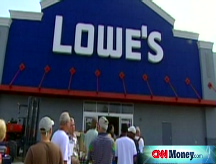Stocks slide for 2nd day
High oil prices, weak retail sales, a drop in homebuilding and a spike in wholesale inflation add to fears about how a spending recession will hit the already-strapped economy.

NEW YORK (CNNMoney.com) -- Stocks slumped Tuesday, falling for the second session in a row, as oil prices rose, retailers' earnings disappointed and reports showed falling homebuilding activity and rising inflation.
Also in the mix: a weaker U.S. dollar and more problems for the financial sector.
The Dow Jones industrial average (INDU) lost 130 points or about 1.1%. The broader Standard & Poor's 500 (SPX) index lost 0.9% and the Nasdaq composite (COMP) lost 1.4%.
After the close, Hewlett-Packard (HPQ, Fortune 500) reported higher quarterly sales and earnings that topped forecasts, sending the stock 1% higher in extended-hours trading. The company also forecast that fiscal fourth-quarter earnings would top current forecasts.
Wednesday brings little in the way of quarterly earnings or economic reports. The weekly oil inventories report is due at 10:30 a.m. ET and will be in focus.
Between the reports on housing and inflation and the disappointing earnings and forecasts from Home Depot and others, there was plenty to unsettle investors Tuesday.
"You had those two macro reads that weren't too encouraging and then a lot of poor results from retailers," said Scott Armiger, portfolio manager at Christiana Bank & Trust Company. "The economy is weak, that's all there is to it."
In mid-July, oil prices peaked at above $147 a barrel and the stock market seemed to make a bottom. Since that time, oil prices have come down and stocks have staged a small recovery. But that trend may not continue much longer, Armiger said.
"We had a little rally on falling oil and some federal intervention on the finance side, but that advance is pretty much tapped out," he said.
Stocks tumbled Monday on talk that the government may have to bail out mortgage financers Fannie Mae and Freddie Mac. Those concerns remained in place Tuesday, with the financial sector among the hardest hit.
Financials: Fannie Mae (FNM, Fortune 500) and Freddie Mac (FRE, Fortune 500) shares slipped anew Tuesday afternoon, giving up morning gains.
Lehman Brothers (LEH, Fortune 500) slid for a second session on speculation that it will report bigger writedowns this quarter than originally thought, with JP Morgan's forecast for about $4 billion. Separately, a report said that Lehman is looking to sell its investment management business. (Full story).
A variety of financial stocks slumped, including Dow components AIG (AIG, Fortune 500), American Express (AXP, Fortune 500), Bank of America (BAC, Fortune 500), Citigroup (C, Fortune 500) and JP Morgan Chase (JPM, Fortune 500).
But declines were broad based, with 25 out of 30 Dow components ending lower. The only big gainers were the oil companies, Chevron (CVX, Fortune 500) and Exxon Mobil (XOM, Fortune 500).
Companies that see their profits directly hit by higher fuel costs declined, including railroad, trucking and airline stocks. The Dow Jones Transportation average lost 2.2%.
Market breadth was negative. On the New York Stock Exchange, losers topped winners by nearly three to one on volume of 1.01 billion shares. On the Nasdaq, decliners beat advancers by five to two on volume of 1.78 billion shares.
Housing and inflation: Both housing starts and building permits - a measure of builder confidence - fell in July to levels not seen since the 1991 recession as the housing market fallout continued. (Full story).
The Producer Price Index (PPI), a measure of inflation at the wholesale level, rose 1.2% in July, double what economists surveyed by Briefing.com were expecting. So-called "core" PPI, which strips out volatile food and energy prices, rose by 0.7%, more than three times what economists expected. (Full story).
Retail earnings: A variety of chain stores issued downbeat results, as consumers continued to cut back amid the slowing economy.
Home Depot (HD, Fortune 500) reported a steep drop in quarterly profit that nonetheless topped expectations. The company reiterated its cautious full-year outlook for weaker sales and earnings that are still above forecasts.
Target (TGT, Fortune 500) reported weaker quarterly earnings that topped forecasts on stronger quarterly sales that were short of expectations.
Saks (SKS) reported a big quarterly loss that missed analysts' forecasts and also issued a dour forecast for the rest of the year.
Staples (SPLS, Fortune 500) warned that second-quarter results, not including its purchase of Corporate Express, would be weaker than anticipated.
Deals: Defense contractor General Dynamics (GD, Fortune 500) said it will buy Jet Aviation for around $2.25 billion to expand its corporate jet business.
Fuel prices: U.S. light crude oil for September delivery rose $1.66 to settle at $114.53 a barrel on the New York Mercantile Exchange, as the threat of Tropical Storm Fay disrupting oil installations in the Gulf of Mexico faded. Oil prices ended the previous session at a 3-1/2 month low.
Retail gas prices dropped overnight, extending a downward trend for a 33rd day, according to a survey of gas station credit-card activity. (Full story.)
Other markets: In global trade, Asian markets tumbled on the financial market woes, and European markets mostly ended lower.
In the bond market, Treasury prices fell, lifting the yield on the benchmark 10-year note to 3.84% from 3.81%. Prices and yields move in the opposite direction.
In currency trading, the dollar fell against the euro and the yen.
COMEX gold for October delivery rose $11.20 to $813 an ounce. ![]()





